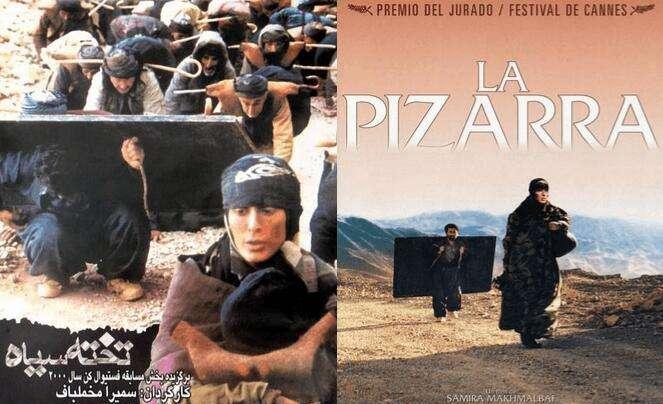Iranian films first came into everyone's sight, probably through touching children's films such as "Little Shoes".

And the movie "Blackboard", heavy, lengthy, obstacles, irony, there is no fierce dramatic contradiction, it is the story of a group of teachers carrying blackboards around looking for students.
Exotic, yellow sand, war, poverty... Regarding Iran, in addition to these images in my consciousness, I would like to share with you some of the interesting points of this movie.
<h1>Documentary style</h1>
The sense of documentary is greater than the sense of story, giving people a sense of documentary, which is actually a double-edged sword, and as far as this movie is concerned, it is really too unfriendly to the audience.
The shaking of the handheld camera creates a kind of visual fatigue, throwing the burden of life experienced by the characters in the picture to the audience to feel together.
A large number of long shots in the long range prolong this tiredness, and the movie for more than an hour is like watching a day.
The desolation and dark tones of the scene, including the gray fog at the end, isolate the audience at the same time, but also make people can't help but find meaning in the nothingness.
<h1>The meaning of the blackboard</h1>
The blackboard is the theme and core of the film, and there are many interpretations of the meaning of the blackboard, enlightenment, hope, the loss of modernity...
As the function of the blackboard changes from writing education to stretchers to carry people, the cover of isolation, the splint of fractures, and the barrier of evasion, the increase in function represents the decline of its original signifier, that is, the decline of educational functions.
<h1>Absurd marriage</h1>
The reason why it is absurd, in addition to the extremely simple process of marriage and divorce, this marriage itself is not a product of love.
I think there are several reasons why Said and Halaleh are together: one is to travel with these people in exchange for food, the other is to stay in this group of returnees to teach, and the third is to say that if there is affection, it must also rank the only one-sided affection last.
Although the old man had promised him forty walnuts, compared to the identity of the guide, there was undoubtedly such a kinship, which could stabilize his affiliation in the crowd and provide convenience and opportunity for him to teach people to read, write and arithmetic in the team.
This also explains why Saad divorced Halaleh because they refused to be educated and were determined to return to Iraq.
<h1>Man and mule</h1>
The child who smuggled the goods twice said that he was a mule, which I think is a more ironic detail than the teacher carrying a blackboard like You Fang Langzhong.
Because according to the children themselves, most of them can read and write, but adults do not allow strangers to tell the truth, they say no, that is to say, these children have a certain cognitive ability.
Children are the hope of the future, this is self-evident, and these children not only give up the opportunity for education because of life, but also think that their identity is just a mule, I have to say that this is the most heart-wrenching point of the film.
<h1>Originality and meaning</h1>
We look at any community that is not me from the cultural perspective and position of the "other," so we can't judge that "they" don't accept what we think of as modern culture as an act of ignorance.
Based on the last point, all the ideas and interpretations can be said to be over-interpreted, but it is precisely because of this cultural difference that we are given a special impression.
After watching this movie, I thought of "Kailash", which was released this year, which is equally documentary, equally heavy, the same about journeys and pursuits, one about the power of faith, and one about the heaviness of enlightenment.